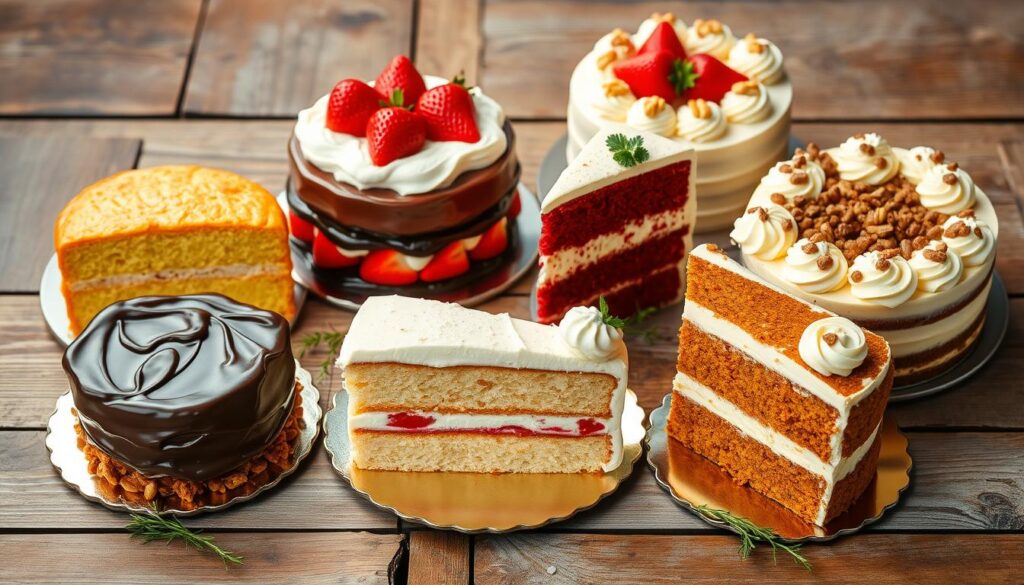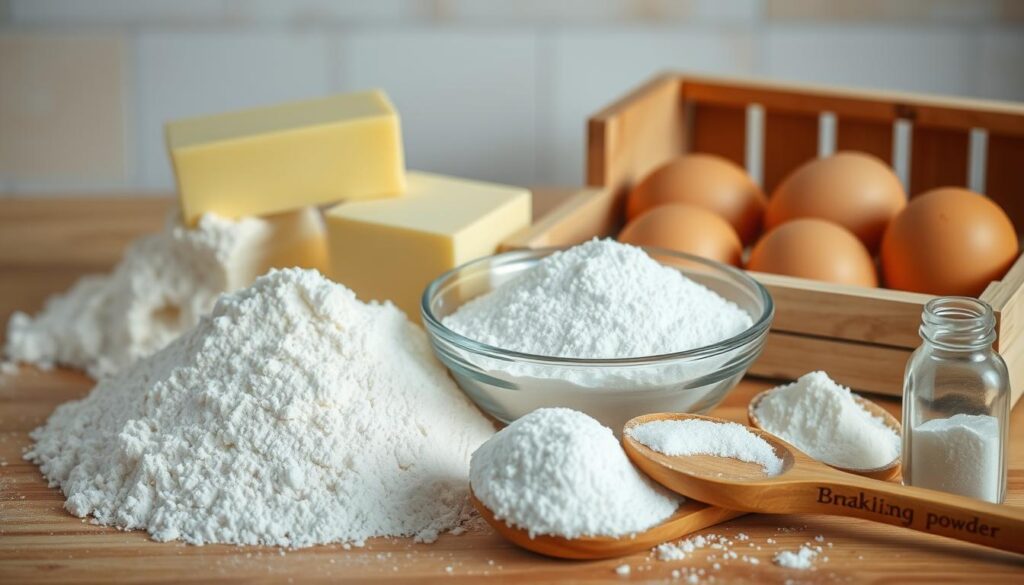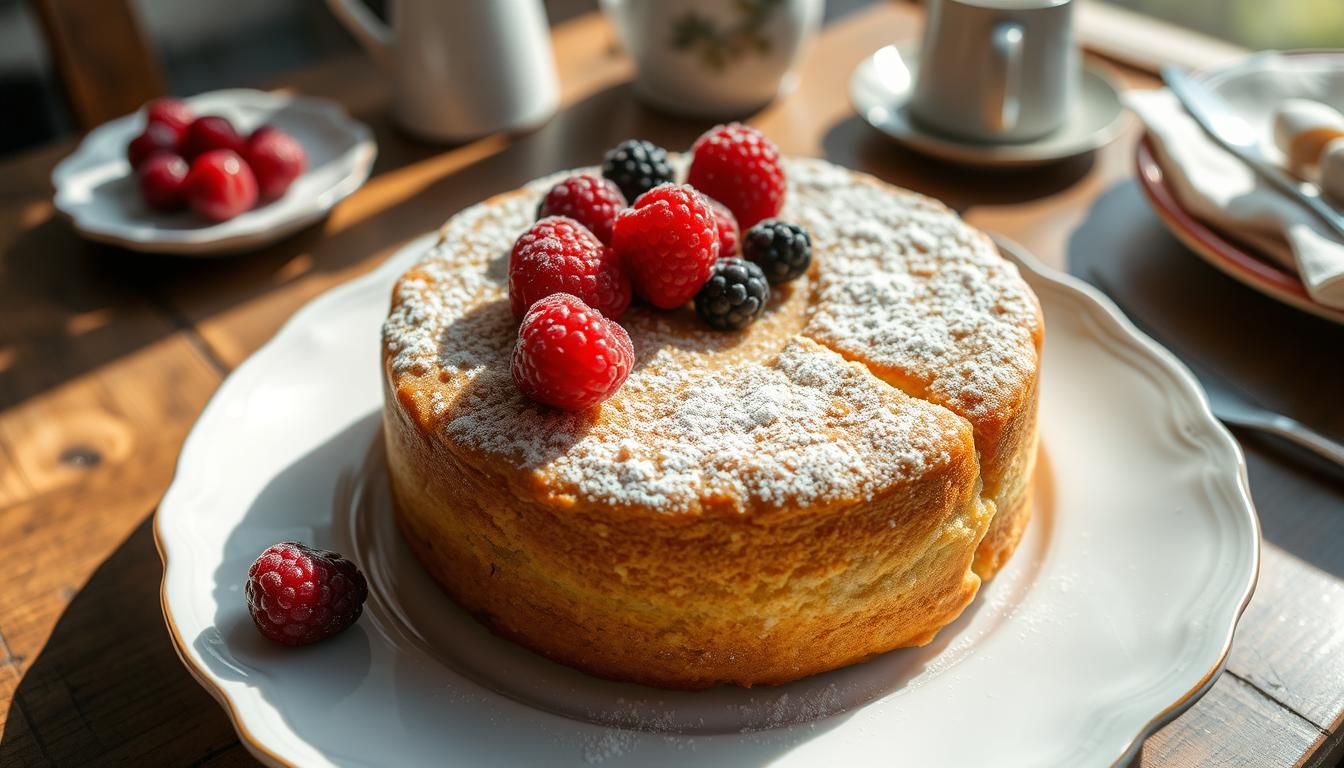Indulge in the delightful flavors of a classic butter cake with this easy-to-follow recipe. Butter cakes are a beloved dessert known for their rich, moist, and tender crumb. They are a crowd-pleasing treat for any occasion. Whether you’re a seasoned baker or a novice in the kitchen, this guide will walk you through the steps to create a perfectly baked butter cake. It will impress your family and friends.
Key Takeaways
- Butter cakes are a classic dessert known for their moist and rich texture.
- This recipe provides step-by-step instructions for baking a delicious cake.
- Explore various flavors and decorating options to make your home made cake unique.
- Understand the key ingredients and techniques for achieving baking success.
- Learn how to properly store and serve your homemade cake.
What is a Butter Cake?
its a classic cake known for its rich, tender, and moist texture. It’s made with butter as the main fat. This gives it a distinct buttery flavor and a dense crumb.
Definition and Characteristics
Butter cakes use butter as the main dairy product in their recipe. This makes them different from other cake types, like oil cakes or sponge cakes. Those use other fats or air to get theire texture.
Difference from Other Cake Types
The main difference between butter cakes and other cake types is their baking method and butter use. Oil cakes use vegetable or canola oil, and sponge cakes use whipped eggs for airiness. But butter cakes get their unique texture and flavor from the rich, creamy butter.
Butter Cake:
| Cake Type | Primary Fat | Texture | Flavor |
|---|---|---|---|
| Butter | Dense, Moist | Buttery | |
| Oil Cake | Vegetable or Canola Oil | Moist, Tender | Neutral |
| Sponge Cake | Whipped Eggs | Light, Airy | Delicate |

“Butter cakes are the quintessential indulgence, with a rich, buttery flavor that sets them apart from other cake types.”
Ingredients for the Perfect Butter Cake
A delicious butter cake recipe starts with the right mix of ingredients. You’ll need top-notch butter, white sugar, fresh eggs, all-purpose flour, baking powder, and sweet vanilla extract. Each one is key to making the cake moist and full of flavor.
Getting the right amount and quality of these ingredients is important. The right mix of butter and sugar makes the cake tender. Eggs add structure and richness. Flour and baking powder make it light and fluffy. Vanilla extract adds a special touch to the taste.
Knowing how each ingredient works together is crucial for a great butter cake. With the right mix of dairy products and pantry items, you can make a dessert that everyone will love.

“The secret to a perfect butter cake lies in the careful selection and balance of its ingredients.”
Step-by-Step Instructions
Baking the perfect butter cake needs careful attention. Let’s go through the steps to make your butter cake recipe moist, tender, and delicious.
Preparing the Batter
Start by creaming the butter and sugar in a big bowl until it’s light and fluffy. This step adds air, making the cake’s crumb even and fine. Then, add the eggs one at a time, mixing well after each addition.
In another bowl, mix the dry ingredients – flour, baking powder, and a bit of salt. Slowly add the dry mix to the butter and sugar, alternating with milk. Stop mixing once everything is just combined. Overmixing can make the cake tough and dense.
Baking and Cooling
Heat your oven to the right baking temperature for cake baking, usually 350°F (175°C). Grease and flour your baking pan, then fill it with the batter. Smooth the top and bake for 30-40 minutes, until a toothpick comes out clean.
After baking, let the cake cool in the pan for 10-15 minutes. Then, move it to a wire rack to cool completely. This slow cooling process helps prevent the cake from cracking or drying out. Only frost or decorate the cake once it’s fully cooled.
Butter Cake:
Variations and Flavors Butter cake is a treat on its own, but baking offers many variations. You can try flavors like chocolate, lemon, almond, and spices. These options let you customize your recipe in countless ways.
Chocolate butter cake is a favorite for its rich taste. It’s made with cocoa powder or melted chocolate. Lemon butter cake, with its bright citrus flavor, is another hit. It’s made by adding lemon zest and juice.
Almond butter cake is great for those who love nutty flavors. It uses almond extract or ground almonds. This turns a simple butter cake into a fancy dessert.
| Flavor Variation | Ingredients | Baking Tip |
|---|---|---|
| Chocolate Butter Cake | Cocoa powder, melted chocolate | Use high-quality cocoa powder for a rich, intense flavor. |
| Lemon Butter Cake | Lemon zest, lemon juice | Add a touch of lemon extract for an extra burst of citrus. |
| Almond Butter Cake | Almond extract, ground almonds | Substitute a portion of the regular butter with almond butter for a nutty twist. |
The type of butter used can change the cake’s flavor. Salted butter adds a savory note, while unsalted butter lets the sweetness shine. Try different butters to find your favorite taste.
Whether you like vanilla or want to try something new, butter cake is versatile. Enjoy the buttery taste and explore all the flavors you can make.
Decorating Your Butter Cake
Turning a simple butter cake into a stunning dessert is an art. You can use classic buttercream or rich ganache for decorating. The right frosting and toppings can make your cake look amazing.
Frosting and Topping Ideas
Buttercream frosting is a top choice for this recipe. You can flavor it with vanilla, chocolate, or fruit purees. This matches the cake’s richness perfectly.
Cream cheese frosting adds a tangy twist. It’s creamy and has a unique flavor. This is a great choice for those who like something different.
Ganache is perfect for a fancy topping. It’s a chocolate glaze that makes the cake shiny. Add nuts, berries, or flowers for a stunning look.
For a simple yet elegant touch, try powdered sugar or caramel sauce. These add a nice finish. Mix and match flavors and textures to match your style and the event.
Decorating your cake is all about being creative. Try out different techniques and colors. Make a dessert that looks as good as it tastes.
Tips for Baking Success
Mastering the art of baking the perfect cake requires attention to detail and the ability to avoid common mistakes. By following these valuable tips, you can ensure your butter cake turns out moist, tender, and bursting with flavor every time.
Common Mistakes to Avoid
Overcoming baking challenges is key to achieving butter cake perfection. Here are some common mistakes to steer clear of:
- Overmixing the batter: Overworking the flour can result in a tough, dense texture. Mix the ingredients gently until just combined.
- Overbaking the cake: Keep a close eye on the oven, and don’t let your butter cake stay in for too long. Overbaking can lead to a dry, crumbly texture.
- Incorrect oven temperature: Ensure your oven is preheated to the right temperature before baking. Fluctuations in heat can affect the rise and texture of the cake.
- Improper ingredient proportions: Carefully measure each component of the recipe to maintain the right balance of flavors and consistency.
By avoiding these common pitfalls and following best baking practices, you’ll be well on your way to creating your homemade recipe that impress and delight.
| Common Baking Mistake | Potential Impact on Butter Cake |
|---|---|
| Overmixing the batter | Tough, dense texture |
| Overbaking the cake | Dry, crumbly texture |
| Incorrect oven temperature | Uneven rise and texture |
| Improper ingredient proportions | Imbalanced flavors and consistency |
By keeping these baking tips in mind and avoiding common baking mistakes, you’ll be well on your way to consistently creating delectable and visually appealing butter cakes that will delight your family and friends.
Serving and Storing Butter Cake
Serving and storing a delicious recipe is key to keeping it fresh. You can slice the cake and enjoy it alone or with vanilla ice cream or whipped cream. It’s a great dessert choice.
For a nice look, arrange the slices on a platter. Add fresh berries or powdered sugar on top. The cake’s rich taste goes well with coffee or milk, making it perfect for any time.
Storing Butter Cake
- At room temperature: Cover the cake with a dome or bowl to keep it moist. It stays fresh for up to 3 days.
- In the refrigerator: Store it in an airtight container or wrap it in plastic wrap for up to 1 week.
- In the freezer: Freeze the cake by wrapping it in plastic or foil, then in a container or bag. It lasts up to 3 months.
Let your recipe come to room temperature before serving. This ensures the best taste and texture.
Butter Cake in Different Cultures
This recipe is loved worldwide, with each place adding its own twist. From the famous British Victoria sponge cake to the fluffy cakes in Southeast Asia, it’s a favorite everywhere. This dessert has been welcomed and changed by cultures globally.
In the UK, the Victoria sponge cake is a classic. It’s light, airy, and has a soft crumb. Often, it’s topped with raspberry jam and powdered sugar, showing the country’s baking heritage.
In Southeast Asia, butter cakes have a tropical twist. In places like the Philippines and Malaysia, they’re made with coconut milk. Sometimes, they even have sweet corn kernels, making them a unique treat.
- The kek lapis of Malaysia, a layered butter cake, shows how butter cake traditions are part of local cuisine.
- In the Philippines, the classic chiffon cake is a light butter cake.
this recipe is a beloved part of cultural celebrations and gatherings worldwide. It shows how this timeless dessert brings people together, one delicious slice at a time.
“Butter cake is a universal language that brings people together, one delicious slice at a time.”
Conclusion
In this guide, you’ve learned how to bake a delicious butter cake recipe. It doesn’t matter if you’re new to baking or have lots of experience. The tips and techniques here will help you make a cake that’s moist, rich, and full of flavor every time.
We’ve looked at what butter cakes are, the ingredients you need, and how to mix and bake the cake perfectly. You’ve also seen how to try different flavors and decorate your cake with frostings and toppings.
Now, as you start baking butter cakes, keep in mind the tips on avoiding mistakes and how to store and serve your cake. Enjoy the baking process and let your creativity show. Share your homemade butter cakes with loved ones and create special moments through dessert.
